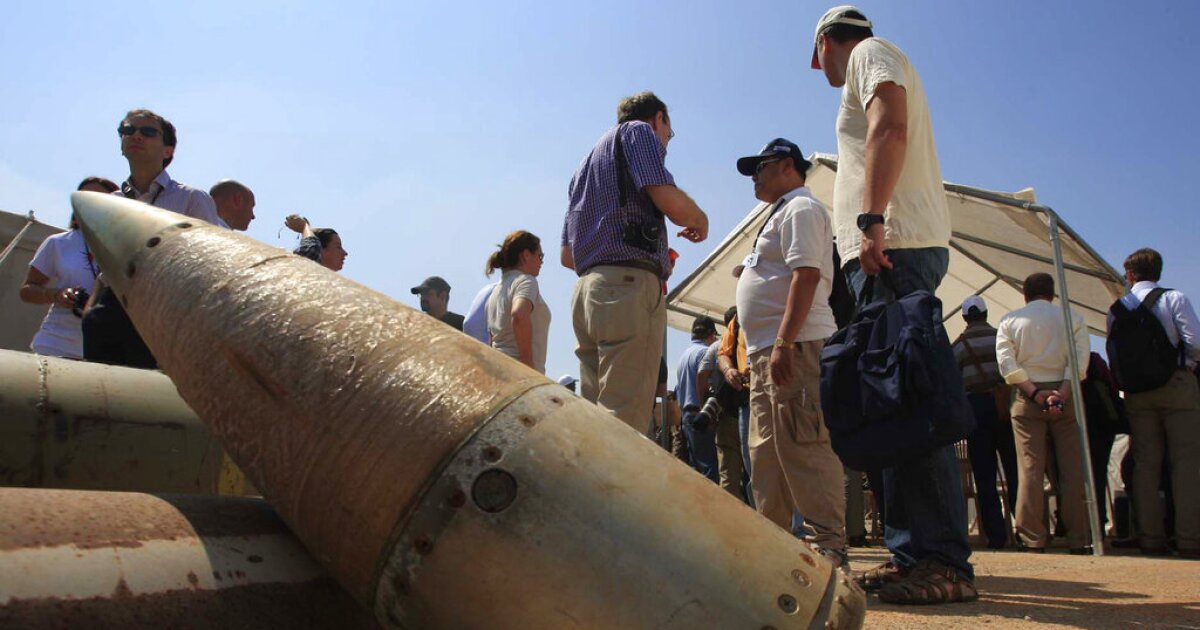

The Biden administration has opted to provide Ukraine with a type of munition for the second time this week that’s been outlawed in more than a hundred countries due to the risks posed to civilians.
President Joe Biden first agreed to provide Ukraine with 155 mm cluster artillery ammunition, which contains submunitions that explode in the air above a target, releasing up to hundreds of smaller bomblets across a more expansive area, in July. Submunitions that fail to detonate essentially become landmines, which can pose a threat to civilians for years after a conflict ends.
ROBERT MENENDEZ INDICTED: DEMOCRATIC NEW JERSEY SENATOR FACES FEDERAL CHARGES OF BRIBERY
“That includes additional ammunition for U.S.-provided HIMARS systems, anti-armor capabilities, artillery, ammunition, and more [dual-purpose improved conventional munition], which have helped Ukraine make gains and crucially also helped Ukraine defend against counterattacks,” national security adviser Jake Sullivan said on Thursday.
The U.S. included the cluster munitions in a $325 million aid package announced on Thursday, though the controversial munitions were not included in packages since that one announced on July 7.
“They were included in this one because Ukraine has found them to be very effective for their counteroffensive, and we and the Ukrainians believe that giving them another tranche will help build on the momentum they have achieved in recent weeks on the battlefield,” a national security council spokesman told the Washington Examiner.
More than 300 people were killed and over 600 wounded by cluster munitions in Ukraine in 2022, according to a report from the Cluster Munition Coalition, a network of nongovernmental organizations advocating a ban of the weapons. Civilians accounted for 95% of cluster munition casualties recorded in 2022, according to the report.
The administration first announced it would provide Ukraine with cluster munitions in part because the U.S.’s munitions stockpile has been dramatically reduced throughout the war in Ukraine and Russia’s use of them. Biden acknowledged days after announcing the aid package that U.S. stockpiles of the munitions they had been giving to Ukraine had gotten “low.”
Human rights groups denounced the U.S.’s decision to send them given the threat they pose to civilians, though the U.S. has tried to limit such risks by providing cluster munitions with a dud rate below 2.35%. Among those who disagreed with the president’s decision was Alice Jill Edwards, the U.N. special rapporteur on torture and other cruel, inhuman, or degrading treatment or punishment.
Edwards sent a letter to the U.S. government in July, about a week after the administration announced it was providing Ukraine with cluster munitions, which was first reported on earlier this week, urging them to reconsider.
“Unexploded submunitions pose a long-term, unpredictable threat to the population, with the potential to cause death or physical harm, as well as significant psychological trauma, including post-traumatic stress disorder (PTSD), particularly because of the strain of the constant anticipation of danger placed on those living in cluster munition-contaminated areas and the fear that such danger may generate in them,” she said.
CLICK HERE TO READ MORE FROM THE WASHINGTON EXAMINER
More than 120 states are a part of the Convention of Cluster Munitions, which was formed in 2010 and prohibits the use, production, transfer, and stockpiling of cluster munitions, including most of the NATO alliance. The only NATO members not a part of the treaty are Estonia, Finland, Greece, Latvia, Poland, Romania, Turkey, and the United States. Neither Russia nor Ukraine are a part of the pact either.
Despite concerns, National Security Council coordinator John Kirby said at about that time that Ukraine was using “them quite effectively,” adding, “They have, once again, without violating their operational security, I will just tell you that they’re using them appropriately, they’re using them effectively, and they are actually having an impact on Russia’s defensive formations and Russia’s defensive maneuvering.”





